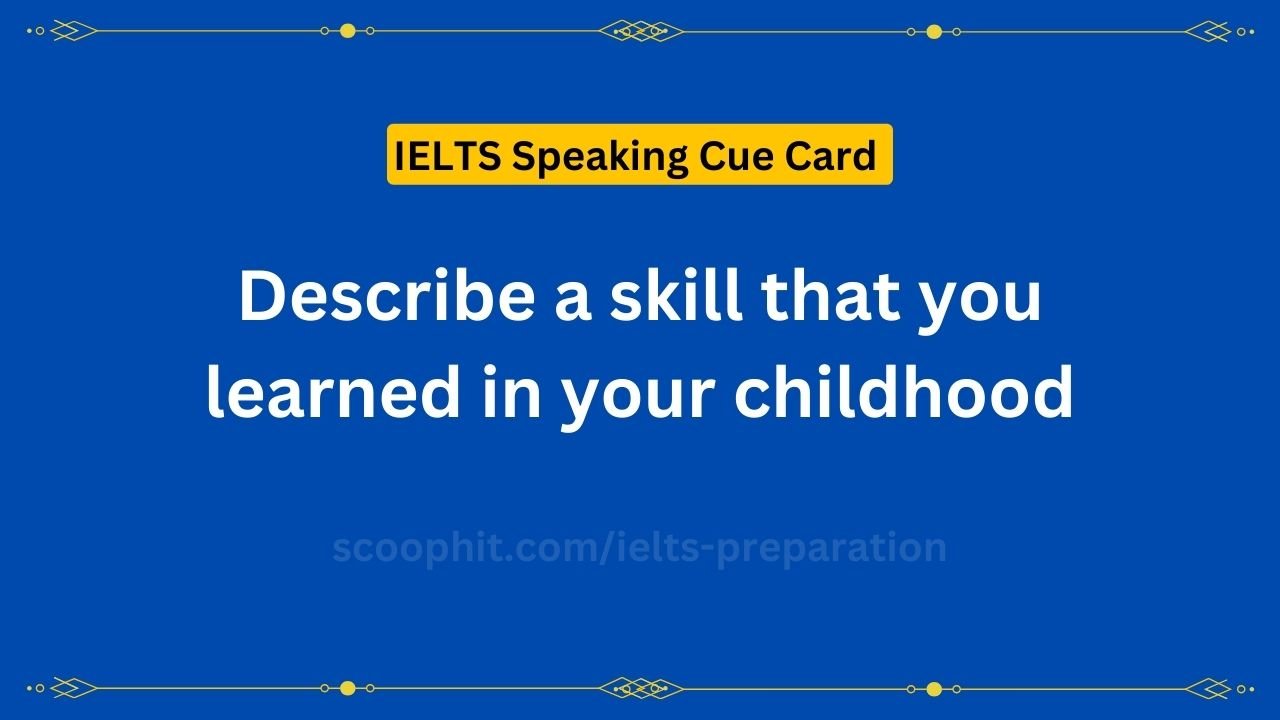Describe a skill that you learned in your childhood : Reflecting on childhood experiences, this IELTS cue card encourages candidates to reminisce about a skill they acquired during their formative years. By elucidating the significance of the skill and its lasting impact, candidates can offer a glimpse into their personal development and character.
Table of Contents
List of Samples : Describe a skill that you learned in your childhood
Sample 1
What the skill was? One of the skills I learned in my childhood was traditional Indian cooking, particularly making chapatis (Indian flatbread).
Who taught you this skill? My grandmother, who is an expert in traditional Indian cooking, taught me this skill.
How they taught you? She taught me by involving me in the cooking process from a young age. I would sit beside her as she kneaded the dough, rolled out the chapatis, and cooked them on a hot griddle. She patiently guided me through each step, showing me the right consistency of the dough and the proper technique for rolling out the chapatis.
And explain why do you think this is important? I believe learning traditional Indian cooking, including making chapatis, is important for several reasons. Firstly, it connects us to our cultural heritage and allows us to preserve traditional recipes and cooking methods. Additionally, cooking skills are essential for self-sufficiency and independence, enabling us to prepare nutritious meals for ourselves and our families. Moreover, it fosters a sense of pride and accomplishment in being able to create delicious dishes from scratch using age-old techniques passed down through generations.
Sample 2:
Describe a skill that you learned in your childhood
What the skill was? A skill I acquired in my childhood was playing the tabla, a traditional Indian percussion instrument.
Who taught you this skill? I was taught this skill by a local tabla teacher who conducted classes in our neighborhood.
How they taught you? The tabla teacher started by teaching me the basics, such as the different strokes and rhythms. We would practice simple patterns together, gradually progressing to more complex compositions. He provided hands-on guidance, correcting my hand positions and technique as needed, and encouraged regular practice to improve my skills.
And explain why do you think this is important? Learning to play the tabla has not only enriched my cultural knowledge but also honed my concentration, coordination, and rhythm sense. It has taught me discipline and perseverance, as mastering the instrument requires dedicated practice and patience. Furthermore, playing the tabla has provided me with a means of self-expression and a connection to India’s rich musical heritage, allowing me to appreciate and participate in our cultural traditions.
Sample 3
Describe a skill that you learned in your childhood
Who taught you this skill? My mother, who is skilled in various forms of traditional Indian embroidery, taught me this skill.
How they taught you? My mother taught me by demonstrating the different stitches and techniques involved in zari work. She patiently guided me through the process, starting with simple designs and gradually introducing more complex patterns. We would spend hours together, sitting side by side, as she showed me how to thread the needle, create different motifs, and embellish fabric with shimmering threads and beads.
And explain why do you think this is important? Learning traditional Indian embroidery not only allows me to preserve our cultural heritage but also serves as a form of artistic expression and creativity. It instills a sense of craftsmanship and attention to detail, as each stitch is meticulously crafted by hand. Moreover, mastering embroidery skills provides a means of self-sufficiency and potential income generation, as traditional Indian textiles are highly valued and sought after both domestically and internationally. Overall, I believe that learning traditional crafts like zari work is vital for preserving our cultural identity and passing on our heritage to future generations.
Sample 4
Describe a skill that you learned in your childhood
What the skill was? One skill I learned in my childhood was swimming.
Who taught you this skill? I was taught by a certified swimming instructor at our local community pool.
How they taught you? The instructor began by teaching me basic water safety and floating techniques. Then, we progressed to learning different swimming strokes, starting with the freestyle and gradually incorporating other strokes such as backstroke, breaststroke, and butterfly. The instructor provided personalized guidance and feedback, correcting my form and offering encouragement as I improved my swimming abilities.
And explain why do you think this is important? Learning to swim is a crucial life skill that not only promotes physical fitness but also enhances safety in and around water. It builds confidence and self-reliance, enabling individuals to enjoy aquatic activities and navigate water hazards with ease. Moreover, swimming fosters a sense of adventure and exploration, opening up opportunities for recreational activities such as snorkeling, diving, and water sports. Additionally, swimming promotes social interaction and teamwork, as it often involves group lessons and aquatic events. Overall, mastering the skill of swimming equips individuals with invaluable abilities that can enhance their quality of life and contribute to their overall well-being.
For More updates do subscribe our Youtube Channel.
